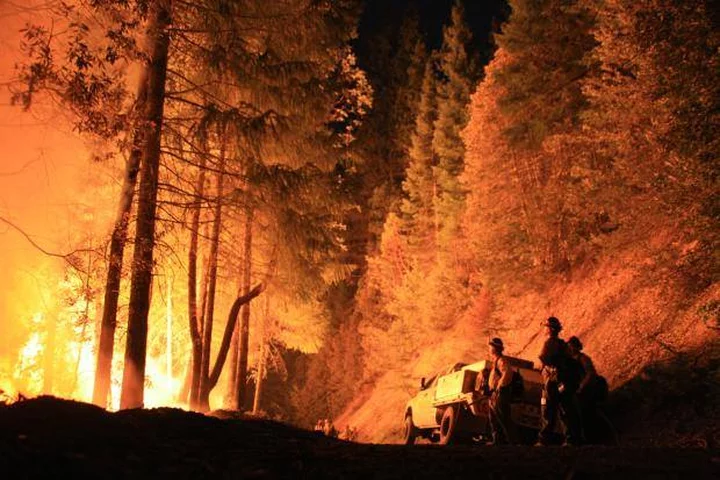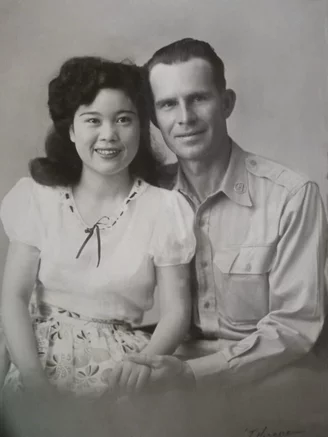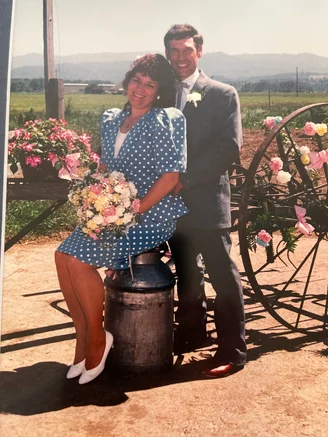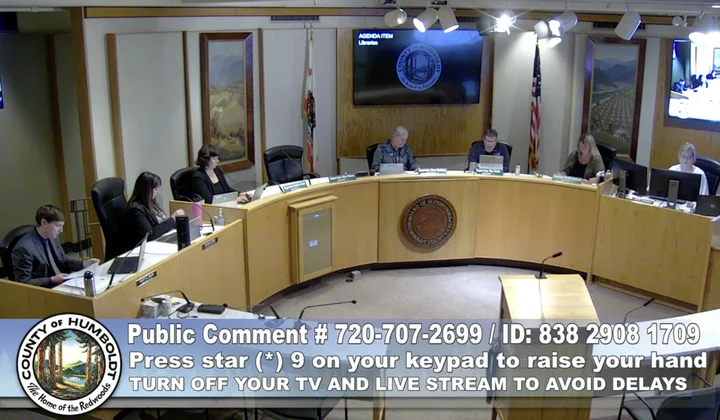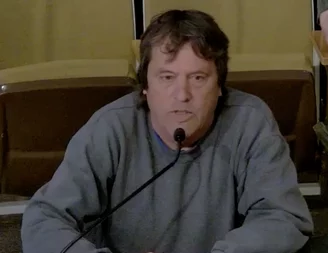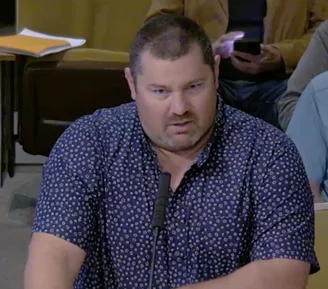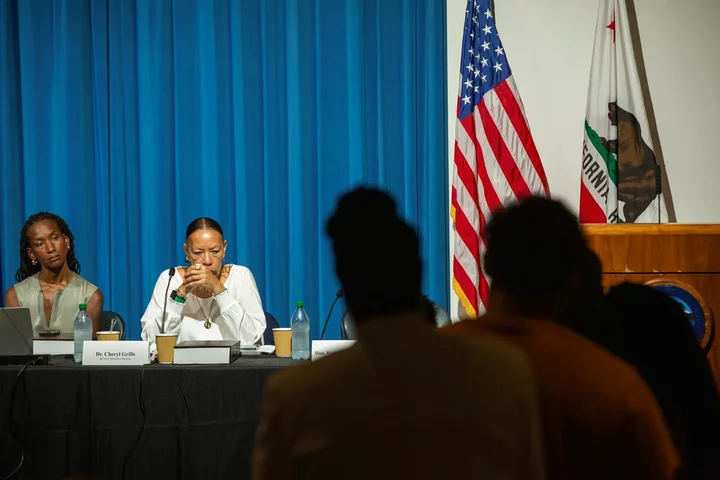California’s Firefighter Union Is Poised to Get a Rare Perk: Guaranteed Raises, Forever
Anabel Sosa / Friday, June 30, 2023 @ 8:07 a.m. / Sacramento
File photo: Six Rivers National Forest.
California wildfire firefighters could be in for a big pay raise soon through a rare legislative move that would require the state to boost their salaries automatically, effectively cutting the governor’s office out of negotiations over their wages
For years, the California Department of Forestry and Protection – or Cal Fire – has been unable to compete with local departments that offer better salaries and in turn has been losing its members at an escalating pace, union leaders say.
“We enter into a world where we now have a world where you can work at Target and In-N-Out and make $22 an hour and our starting firefighter makes $15.56 an hour,” said Cal Fire Local 2881 president Tim Edwards. “Who’s gonna want to put their life on the line in a time where the state really needs firefighters when they can go work somewhere else and make more money?”
Now, after several years of devastating wildfires, state lawmakers are advancing a bill that would lock in automatic pay increases for them. It would compel the state human resources department to calculate wage increases for the 8,000 or so state firefighters every year based on what other 20 local fire departments pay.
The bill would boost the salary for Cal Fire employees to within a 15% range of the top 20 highest-paying fire departments in California.
If the bill becomes law, the firefighter union would become just the second group of California public employees to gain automatic pay raises instead of having to bargain over wage increases with the governor’s office.
The other is the union that represents California Highway Patrol officers. The CHP contract sets officers’ pay on a formula that accounts for wages at other large California police departments. It’s a lucrative perk. Last year, CHP officers received a 6.2% wage increase — the biggest they have seen in 20 years and more than double what Newsom gave to other public employee unions that year.
Lawmakers, including Republicans, say it’s time for Cal Fire to gain the same kind of wage guarantee.
“Cal Fire is one of the greatest public safety organizations, in my opinion, in the world,” said Assemblymember Heath Flora, a Republican from Ripon who sponsored the bill.
“I really want the men and women in this state to be paid properly and for some reason we always felt like they’re overlooked. And I don’t really understand it,” said Flora, a former firefighter.
The bill is moving forward as the Newsom administration bargains with unions representing more than half of the state workforce, some of whom are demanding 30% raises.
The firefighter pay bill passed through the Assembly and is now headed to the Senate appropriations committee with no opposition even as the state faces a projected $32 billion deficit.
Cal Fire itself has not weighed in on the bill. Edwards, the union leader, said the department lost 10% of its firefighters last year.
California wildfires strain overworked crews
Cal Fire is the state’s largest fire department. It’s responsible for fighting wildfires, as well as protecting urban areas in several parts of the state.
The intensity of wildfires in California is projected to worsen. The state saw its worst wildfire season on record in 2020, taking a toll on firefighters who spent weeks in the field.
The California Professional Firefighters, an umbrella union that represents some 30,000 firefighters, is lobbying for the pay bill. The union in a written statement to lawmakers said the risks of short staffing compounds the dangers that come with the line of work and “also presents long-term health impacts from extended exposure to toxic smoke with no respiratory protection as well as the negative repercussions for behavioral health from lack of sleep, overwork, and months on end spent away from family.”
“If I learned anything in the past decade, it’s that our wildfire season is absolutely out of control. It really never ends.”
— Assemblymember Heath Flora
The Cal Fire union in its most recent contract attempted to address difficult working conditions by bargaining for a schedule that would give its members a better work-life balance. Cal Fire firefighters usually work four 72-hour shifts each month. Local fire departments tend to operate on 54-hour shifts.
“If I learned anything in the past decade, it’s that our wildfire season is absolutely out of control. It really never ends,” Flora said.
Cal Fire fighter salaries lag
If the bill passes, Cal Fire Local 2881 would still have to bargain with the governor over issues like discipline and working conditions.
Cal Fire firefighters are paid through a complicated formula that accounts for their scheduled overtime hours. Their hourly wages are as low as minimum wage, but their take-home pay adds up through overtime and other compensation.
The average monthly total compensation for a Cal Fire battalion chief was $29,697, according to a 2020 salary survey. That was about 40.7% below what 20 local fire departments of various sizes paid firefighters at that rank, the survey said.
Lower-ranking firefighters earned $19,288 monthly in total monthly compensation, which was 15.8% below what local departments paid.
Outside of the Legislature, critics of public employee unions characterize the bill as a reckless giveaway to a powerful labor organization.
“Firefighters are already among the best-paid government workers in the state,” said Will Swaim, president of California Policy Center, an advocacy group that is critical of California public employee unions.
“No one else in California gets that deal,” he said.
Michael Genest, the former finance director under Gov. Arnold Schwarzenegger, also called promises of future raised “irresponsible.”
“Governors and legislators always regret having made such promises when our budget goes out of balance,” he wrote in an email. “The wise move is to make decisions about the allocation of state revenues each year and even then to be careful not to spend more on anything than is prudent.”
###
CalMatters.org is a nonprofit, nonpartisan media venture explaining California policies and politics.
BOOKED
Yesterday: 7 felonies, 15 misdemeanors, 0 infractions
JUDGED
Humboldt County Superior Court Calendar: Today
CHP REPORTS
No current incidents
ELSEWHERE
RHBB: Cal Fire Lifts Burn Suspension in Mendocino County
Growing Pains, with Nick Flores: #230 - U.S.-China Tensions: Trade, Power, and Global Futures with Scott Kennedy
Politico: Johnson says he had ‘thoughtful’ conversation with MTG about bucking Republicans on healthcare
Governor’s Office: Governor Newsom signs bill to protect parents’ rights and children
OBITUARY: Kalub Joshua Ulmer, 2023-2023
LoCO Staff / Friday, June 30, 2023 @ 6:56 a.m. / Obits
Kalub Joshua Ulmer, aka Baby Cheeks, came into this world on March 21, 2023. He made an impact on everyone around him, and even those who didn’t get the chance to be blessed with his presence. He was a special soul who had a rough beginning, but made improvements daily. A beautiful light in life who took a huge piece of our hearts with him in death.
Kalub was born in Eureka and transported to Oakland Children’s Hospital four days after he was born; he needed special care and treatment that required him to be there until May 8, when he was released to his aunt and uncle, who looked forward to caring for him and adopting him when the time came. Kalub was taken from us too soon and suddenly, while he slept on June 4. We woke to a nightmare that no parent or guardian should ever have to go through. Your baby should never go first. He was loved, cherished and perfect in every way. His wings were ready, but our hearts absolutely were not.
A celebration of life will be held for Baby Cheeks’ close family and friends in his birth city of Eureka. This celebration of his life will include enjoying pictures, food, music and stories about how he was loved in every way during life. His celebration of life, as painful as it is, is to help us all to find a new way to live without him while we hold him close spiritually, mentally and emotionally in our hearts and minds.
Not a day will go by when we don’t feel him. We celebrate the time we had with him because he was a gift. We celebrate the progress he made and the love we have for him; although his time earthside was short, the love we have for him will last a lifetime.
Kalub is survived by his many family members: biological parents, his aunt Larissa and uncle Jason; as well as many more aunts, uncles, grandparents and his siblings: Macy~Rain Fowler and Adam Klammes, as well as his cousins: Ariyus Pace, Kaityra Pree, Nyira Pree, Izreal Pree, Thomas Postolka, Ivan Stugard and Ayden Postolka.
###
The obituary above was submitted on behalf of Kalub Ulmer’s loved ones. The Lost Coast Outpost runs obituaries of Humboldt County residents at no charge. See guidelines here. Email news@lostcoastoutpost.com.
OBITUARY: Fusae Waters, 1928-2023
LoCO Staff / Friday, June 30, 2023 @ 6:56 a.m. / Obits
Fusae Waters (née Yoshimura) passed away peacefully in her home in Eureka on May 27, 2023.
Fusae was born in Kita-Kyushu City, Japan on August 18, 1928, as the second of three children to Kikujiro Yoshimura and Tome Yamashita, and was a descendant of samurai lineage on her mother’s side. Fusae was a very bright child. She was admitted to high school in the early 1940s, which was extremely rare for females in Japan at that time; girls’ education beyond middle school was not compulsory and only those who were top academic performers could attend high school. Her education was interrupted by World War II when she arrived at school one day only to find it had become a crater after being bombed. Thereafter, she survived the war conscripted to work in rice fields. Years later she recounted how lucky she was to have worked in the rice fields and not the factories (as some kids were forced to) because factories were allied targets. The war ended and Fusae eventually graduated high school with honors.
In her early twenties, in the interest of improving her English, she applied for a job at the post exchange on the U.S. Air Force base in Fukuoka, Japan. While working in the post exchange she met an American airman, Floyd Waters, who was stationed there during the Korean war and he would eventually become her husband. After marrying and giving birth to their first child, Danny, in Japan, they moved to Arizona in 1953. Their stay in Arizona was brief, as Fusae hated the heat and complained to Floyd, which led them to eventually settle in Eureka. Fusae and Floyd had three more children: Eugene, Patricia, and Donald.
She eventually began a long career at General Hospital in Eureka as a housekeeper in the Labor and Delivery Department until she retired after 25 years of loyal service. Fusae was beloved and respected by her co-workers at the hospital, and she equally loved working there. She would often fondly tell her family after she retired about all the interesting people she worked with at the hospital. Fusae also settled into Humboldt County’s small, but vibrant Japanese community comprised mostly of women who had also married American GIs. For years she and her other Japanese friends cooked together, sang karaoke together, played bingo together, and laughed together. Fusae had a nickname within the Japanese community of “the saint” – no matter how much gossip she heard, she never repeated a word – a value she tried hard to instill in her grandchildren.
Fusae was a passionate gardener with an amazing green thumb. She grew all sorts of incredible fruits, vegetables, and flowers in her sizeable backyard – her blueberries were particularly legendary. She loved animals, and on more than one occasion she nursed baby birds who had fallen from their nests back to their health, until they were mature enough to fly off into the wild. Fusae had a heart of gold, a pure soul, and positively impacted the lives of all who knew her. Fusae was an amazing human, with an exceedingly rare amount of compassion for all. She will be missed beyond the words of human expression, but her memory and the life lessons she taught us will forever live in our hearts.
Fusae is preceded in death by her husband Floyd, her sons Danny and Eugene, her parents Kikujiro and Tome Yoshimura, and her older brother Iseo Yoshimura. She is survived by her daughter Patricia Waters, son Donald Waters, grandchildren Jiro Waters, Erica Botkin and Alex Botkin, and her younger brother Mitsuaki Yoshimura.
There will be no memorial service, and instead of flowers her family has asked that donations be made to Hospice of Humboldt or to charity in Fusae’s name.
###
The obituary above was submitted on behalf of Fusae Waters’ loved ones. The Lost Coast Outpost runs obituaries of Humboldt County residents at no charge. See guidelines here. Email news@lostcoastoutpost.com.
OBITUARY: Don and Mary Pedrotti, 1951/1950-2023
LoCO Staff / Friday, June 30, 2023 @ 6:56 a.m. / Obits
Don Pedrotti, born December 30, 1951, at Redwood Memorial Hospital and Mary Mello, born April 5, 1950, at St. Joseph Hospital in Eureka passed away within 10 days of each other last March 2023 — Don on March 18 at home in his sleep after a long illness and Mary, his wife, on March 28 at St. Joseph Hospital — after battling a prolonged fight with diabetes and two strokes.
Don spend his entire life in Ferndale, graduating from Ferndale High School in 1970. He worked a few jobs including pulling green chain at Pacific Lumber Scotia and pouring concrete for Carl Brungs before taking over the family dairy farm on Grizzly Bluff Road in Ferndale.
Mary grew up in Arcata on a dairy farm until the family moved in 1956 to Orland and then to Lac La Hash, British Columbia, in 1960. They moved back to Blue Lake California in 1964, just before the big flood and ending back in Arcata again, where she graduated from Arcata High School in 1968. Mary worked with her best friend Rosie at all kinds of jobs, from Dot’s Restaurant, picking daffodil bulbs in McKinleyville and crab and shrimp for Lazio’s Seafood in Eureka to working data processing at St Joseph’s Hospital and the front office at Humboldt Central Labs.
Don and Mary met at a dance in Ferndale and married in the barn at their dairy farm on July 27, 1991, and lived and worked the farm life until Don retired in 2006.
Don was a hunter and looked forward to his yearly hunting trip to the cabin and making Italian sausage with his brothers. Mary enjoyed raising their boy Sonny and the annual Halloween party in the barn for all the kids. She also loved working in her yard and planting flowers everywhere around her home. Mary had a gift to make people laugh and she always left you with a smile. They will be sorely missed.
Don and Mary are survived by their son Nick and his wife Lacey and granddaughter Anna; and son Sonny Pedrotti; Don’s siblings Dan Pedrotti, Sylvia Grandy, Sid Pedrotti and their spouses and many nieces and nephews. Mary’s siblings are Dorothy Mello, Joseph Mello Jr. and his wife Teresa Mello, Barbara Mello-Wolf and many more nieces and nephews and great- and great-grand-nieces and -nephews.
A potluck celebration of life for Don and Mary will be held July 22 from 1 p.m. to 4 p.m. at Ferndale City Hall Auditorium. Family and friends of Don and Mary are cordially invited.
###
The obituary above was submitted on behalf of Don and Mary Pedrotti’s loved ones. The Lost Coast Outpost runs obituaries of Humboldt County residents at no charge. See guidelines here. Email news@lostcoastoutpost.com.
OBITUARY: Barbara Mae Rice, 1943-2023
LoCO Staff / Friday, June 30, 2023 @ 6:56 a.m. / Obits
Barbara Mae Rice, 80, of Arcata, passed away, Thursday, April 27.
Barbara was born on February 16, 1943 in Cleveland, Ohio to Howard Ludwig and Gertrude Romisher.
Barbara grew up with her sisters Pauline, Debbie, Cher and brother Eddie in Euclid, Ohio.
She attended Ohio State becoming a licensed practical nurse and met her husband, Roger Rice, who was studying to become a geologist. They had a daughter, Vanessa Rice.
She moved to California for the remaining years of her life and lived by her sister Pauline and daughter Vanessa. She worked as a Librarian at Cher-ae Heights Rancheria in Trinidad.
She loved to read, garden, sew and do artwork in her spare time.
She is survived by her daughter, Vanessa Rice, sisters, Debbie DeMarco and husband Dean DeMarco, Cher Pokorny and husband Ken Pokorny, brother, Eddie Romisher and his wife Linda Romisher, niece Chantel Henderson and husband David Henderson and children Jackson, Dylan and Matthew.
Your wings were ready but our hearts were not. Our love is eternal.
###
The obituary above was submitted on behalf of Barbara Rice’s loved ones. The Lost Coast Outpost runs obituaries of Humboldt County residents at no charge. See guidelines here. Email news@lostcoastoutpost.com.
THE FAIR MUST GO ON! Humboldt Supervisors Pony Up $1 Million to Fund Emergency Improvements to the Grandstands at the Ferndale Fairgrounds
Isabella Vanderheiden / Thursday, June 29, 2023 @ 4:50 p.m. / Local Government
Screenshot of Thursday’s emergency Board of Supervisors meeting.
PREVIOUSLY:
###
The Humboldt County Board of Supervisors unanimously approved a $1 million funding request this Thursday afternoon to pay for emergency repairs to the grandstands at the Ferndale Fairgrounds that were damaged during the Dec. 20 earthquake.
If the grandstands aren’t repaired soon, the Humboldt County Fair Association will have to cancel the popular horse races.
A few months after the earthquake occurred, the county hired a structural engineering firm to perform an in-depth inspection of the grandstands. The county recently received the initial draft assessment determined that the building “currently appears adequate to support vertical loads, but not lateral (seismic) loads of the type that need to be taken into account for occupant safety,” according to the staff report.
“In a major earthquake, the roof of that facility could fall,” Public Works Director Tom Mattson told the board. “The grandstands will not collapse, but the roof could come off and there’s a fall zone around the entire grandstand of about 66 feet that needs to be protected.”
With opening day less than two months away, staff asked the engineering firm to come up with some options that would allow the county to repair the grandstands in time for the fair. The problem: There are other deferred maintenance and other earthquake-related repairs that the county needs to address.
“This project does not do anything for the deferred maintenance or the earthquake repairs,” Mattson said. “We’re just stabilizing the existing facility and not making any real improvements or repairs to the damage that the facility has, but it would make [the grandstands] usable. … We’ve met with a number of contractors on site … [and] we did get a note from one contractor this morning that they could do it if they got the ability to work six days a week and got noticed to move ahead very quickly.”
The temporary fix would cost the county upwards of $1 million. There’s a possibility that a chunk of those funds could be reimbursed through the state Office of Emergency Services (OES), but “that is not a guarantee,” Mattson said. “It does qualify for some OES funding because it was damaged in the earthquake and that is 75% reimbursable but they will not pay for deferred maintenance. … I’m pretty confident we can get some reimbursement but I can’t guarantee that.”
The other option is “a controlled failure” in which staff would essentially control where the roof would fall. “If we can do that and protect the racetrack then the races could still occur, but the grandstands could not be occupied,” Mattson said.
First District Supervisor Rex Bohn asked if there was a possibility that the temporary fix could be able to tie into a permanent fix down the line. “Or are you talking about a teardown [and] a complete rebuild for a permanent fix?”
“We are not talking about a teardown,” Mattson said. “We haven’t even gone there at this point. Our whole focus was looking at how could we get this facility back open for the fair.”
Second District Supervisor Michelle Bushnell asked what temporary stabilization of the grandstands would entail and if it would involve taking the roof off the facility. Mattson said the contractors would provide metal supports at 25-foot intervals on all sides of the facility to provide extra reinforcement
Bushnell noted that the county isn’t exactly “flush with any kind of money” and asked where the funding would come from and whether the board could afford to allocate any additional funds from the Local Assistance and Tribal Contingency Fund.
“We have $1 million that’s available in the remainder of our 2020 finance plan that could be accessed immediately and I would certainly advocate for that to be the first route for funding,” said County Administrative Officer Elishia Hayes. “We have $2 million in Local Assistance and Tribal Contingency Funds that your board has decided not to allocate to wait to see how the next fix fiscal year shakes out.”
Hayes added that the county would have to continue working with the Humboldt County Fair Association to better understand the total cost of the project and if they would be eligible for reimbursement.
Speaking during public comment, Andy Titus, board president of the Fair Association, emphasized the countywide economic impact of the Humboldt County Fair and urged the board to allocate the funds for a temporary fix.
“If we cannot use the grandstands and we can’t have horse racing, that eliminates the majority of that revenue that comes from out of the area into [our community],” Titus said. “That helps the small businesses continue, that helps the grocery stores, that helps the gas stations, that helps the taxes that you guys get from. Obviously, it helps us as well. I just think that this has to be a group effort and we have to work together to figure out how to make this happen.”
Michael Gunner, a resident living in the Humboldt County Fairgrounds RV Park, criticized the Fair Association and the county for failing to adhere to ADA compliance standards in the RV park and the restrooms.
“The stadium three years ago got an elevator that’s still sitting on the ground,” he said. “Depending on how the [Fair Association’s board] meeting goes tonight and what they do, my attorneys will probably file for an injunction to shut the fairgrounds down. … You’ve got some major problems and people who are disabled are being discriminated against, so you need to take that into consideration. … I’ve never done this before but I need to stand up and speak at this point.”
Area resident Cindy Olsen described several improvements the Fair Association had made during her 24 years on the board, including ADA improvements to facilities. “We just had a lift installed in our grandstand to accommodate the disabled,” she said. “The cost for this was over $75,000 [and] that amount was covered by a trust. … The fair has constructed a super box just past the finish line to accommodate the higher-end sponsors and the handicapped.”
Following public comment, Bushnell made a motion to approve the $1 million funding request from the county’s 2020 finance plan and directed staff to return to the board should the funding request exceed that amount. She also requested that Bohn join Hayes and Mattson in working with the Fair Association throughout the repair process. Bohn seconded the motion.
Fourth District Supervisor Natalie Arroyo and Fifth District Supervisor and Board Chair Steve Madrone were a little more hesitant to move ahead with the funding request given the nature of the county’s finances.
“I just have a lot of apprehension about spending more than what we can finance given the state of our county budget,” Arroyo said. “I’m on board with addressing those immediate concerns but what it looks like longer term I think we do have to grapple with. This is not an easy time to consider expenditures above and beyond what we can include in the finance plan.”
Arroyo added that she and her partner had their first date at the Humboldt County Fair and, while it holds a “special place in [her] heart,” she felt compelled to note the concerns of her constituents surrounding horseracing.
“I gotta say, I’m more interested in maintaining our infrastructure and helping to support all the other things that the fair is and does for people, like the kids that show their sheep,” she said. “I don’t really want to kind of center this around the support of horse racing or the community pros or cons with respect to that. … But that said, I know that it’s a big revenue generator and the Fair has a lot of other aspects that mean a lot to a lot of people. So, I get it.”
Similarly, Madrone expressed his love for the fair but noted that the county is in “a world of hurt with our budget.” He asked if Fair Association staff had an estimate of how much revenue the fair – specifically horseracing – brings in annually.
“It’s hard to give you an accurate number but I can tell you admissions would be way down,” Titus responded. “I mean, if you go there on Ladies Hat Day or the other Saturday there are 5,000 people there. Would they come without the horse racing? I don’t know. Some may, most probably wouldn’t. The truthful answer is we don’t know.”
“But it’s not a million dollars?” Madrone asked.
“For one year? No. It’s not a million dollars,” Titus said. “But I can guarantee you if you don’t invest this million this year that county is going to lose three to four million dollars that the fair brings in that support the local businesses. I can give you that number pretty confidently.”
Madrone also asked about the status of ADA improvements at the fairgrounds. Assistant CAO Karen Clower said the county completed “quite a bit of work” and “met the terms of the consent decree at the time” between 2016 and 2020.
“There is a large amount of work that still needs to be completed at the fairgrounds,” she said. “It is included in our compliance plan that your board adopted in 2020. We do have a timeline laid out for that and we are looking forward to working with the Fair Association on completing the barriers that remain.”
Bohn noted that he would rather see the money spent on other infrastructure improvements on Mattole Road but emphasized that there is no way around it. “This building is ours,” he said. “We have to fix it.”
After a bit of additional discussion on the merits of horseracing and potential opportunities for reimbursement, the board approved the funding request in a unanimous 4-0 vote, with Third District Supervisor Mike Wilson absent.
###
The Humboldt County Fair Association board will hold a meeting to discuss the matter this evening (Thursday) at 5 p.m.
California’s Reparations Panel Delivers Recommendations as Some Bemoan Newsom’s Absence and Supreme Court Ruling
Wendy Fry and Rya Jetha / Thursday, June 29, 2023 @ 3:44 p.m. / Sacramento
Members of the Reparations Task Force listen to testimony during a hearing at the March Fong Eu Secretary of State offices in Sacramento on June 29, 2023. Photo by Semantha Norris, CalMatters
California’s reparations task force delivered its final recommendations to lawmakers in Sacramento Thursday, and some in the audience commented on the absence of one of the early champions of the task force, Gov. Gavin Newsom.
Task force members also noted the irony of the U.S. Supreme Court ruling against affirmative action in higher education on the day the task force’s nearly 1,200-page final document, with hundreds of recommendations, is released to the public.
“I would encourage the Supreme Court to read the interim report,” said Cheryl Grills, a task force member. “I would encourage them to read the final report and understand the legacy of enslavement, and the ongoing harms that are with us to this very day.”
Secretary of State Shirley Weber, whose bill created the task force, called the High Court ruling a “heartbreaking” regression.
“Most of our policy prescriptions are not race-based, but they’re based on lineage. We made the right decision.”
— Kamilah Moore, chair of the Reparations Task Force
The state’s nine-member task force set out in 2020 with the mission to form recommendations for how California could repair the harm from centuries of systemic racism and the legacy of slavery. California became the first state in the nation to have such robust public discussions on reparations.
It wasn’t always pretty. During 200 hours of public meetings, there were some tense exchanges among the hundreds of public commenters and witnesses. And thousands of pages of public documents were written with the help of the state’s Department of Justice.
Now, two years later, Weber and several members of the Black Caucus addressed a full Secretary of State’s auditorium.
“I felt very strongly that if any state could do it, it would be California,” said Weber, during a news conference beforehand.
Proposed reparations
Key parts of the recommendations include reparations payments to descendants of enslaved people, a formal apology, and dozens of policy changes aimed at redressing discrimination against African Americans.
One persistent debate was over who would be eligible for reparations. The task force voted in 2022 that descendants of enslaved people or of Black people living in the United States before 1900 would qualify.
Kamilah Moore, who chaired the task force, said Thursday its decision means the Supreme Court’s affirmative action ruling on racial preferences won’t affect reparations payouts, if approved.
“Our work remains unaffected by that decision largely because of the wisdom that we had in consulting with legal experts … and that’s why most of our policy prescriptions are not race-based, but they’re based on lineage,” she said. “We made the right decision.”
If adopted the recommendations could mean hundreds of billions of dollars in payments to eligible Black Californians — the broadest proposal in the nation’s history to address past injustices. Taskforce members noted, however, that the panel did not recommend specific reparations amounts, though its report included calculations of what may be owed to most Black Californians.
“Our goal was to study and expose and educate. We have done that,” said state Sen. Steven Bradford, a Democrat from Gardena who is on the task force. “Now it’s up to Californians and the rest of America to read the report and understand what’s there.”
It’s unclear how those recommendations will be received.
Newsom’s absence
Newsom, who made introductory remarks at the task force’s first meeting two years ago, did not attend this, the final meeting. As the meeting convened, Newsom was in Nevada County meeting with state fire officials and the press to discuss plans for the wildfire season.
“The last thing the fire needs is another politician,” said Jonathan Burgess, a fire battalion chief from Sacramento and advocate for reparations. “If you (Newsom) are not here, I want you to know that Black America is watching nationwide.”
Weber said the reparations report was produced for the Legislature, not the governor.
“I’m not responsible for the governor,” she said. “The governor can only do so much. It is the legislature that has to formulate the programs.”
“A check alone will not repair the injustices done, and it would be an injustice to this nation for reparations for descendants to be just a check.”
— Jonathan Burgess, fire battalion chief
Newsom has not said if he will support the task force’s findings, adding he will evaluate the plan when it is delivered to the state legislature. He has frequently said, however, that reparations are more than just payments.
“That implies a deeper rationalization of what is achievable, what is reasonable and what is right. And that’s the balance that we’ll try to advance,” he said on Fox News’ Hannity show.
He noted that Ronald Regan okayed reparation payments to Japanese Americans affected by internment during World War II.
“It doesn’t have to be in the frame of writing a check,” Newsom said. “Reparations come in many forms, but one cannot deny these historical facts.”
Burgess said his great-great-grandfather was brought to California as a slave to mine for gold. He said he agrees with Newsom that reparations are more than a check.
“A check alone will not repair the injustices done,” he said, “and it would be an injustice to this nation for reparations for descendants to be just a check.”
Bigger than state budget
The reparations task force report, which identifies methods for calculating reparations, suggests Black residents may be owed a total of more than $800 billion for decades of over-policing, disproportionate incarceration and housing discrimination. That price tag is more than two-and-a-half times the size of the state’s annual budget.
California lawmakers recently passed a nearly $311 billion state budget package covering a nearly $32 billion deficit with a combination of spending cuts, delayed spending and borrowing.
Few lawmakers have spoken in support of the preliminary recommendations of the reparations task force, but many have said they were awaiting the final report. In CalMatters’ informal email poll of all 120 state legislators, five lawmakers not on the task force responded.
Those who have expressed support include La Mesa Democrat Dr. Akilah Weber, Moreno Valley Democrat Corey Jackson, Tina McKinnor, a Democrat from Inglewood, and Damon Connolly, a Democrat from San Rafael.

A man in the crowd holds up a sign at the Reparations Task Force hearing at the March Fong Eu Secretary of State offices in Sacramento on June 29, 2023. Photo by Semantha Norris for CalMatters
In opposition is Assemblymember James Gallagher, a Republican from Chico, who in a statement asked: “How can we ask new immigrants and low-wage workers to foot the bill for something done 150 years ago, on the other side of the country?”
Bradford said many lawmakers were understandably waiting to see the final report, out today.
“There’s going to be support there, but again asking people right now to stand up and state definitively that they are in support of that, very few are willing to do that at this point,” said Bradford.
Mixed reactions
Many Californians support an apology, but the idea of payments to Black Californians has garnered mixed support. In a 2023 survey by the nonprofit Public Policy Institute of California, nearly three out of five Californians supported the state issuing a formal apology for human rights violations and crimes against humanity for enslaved Africans and their descendants.
Although most Californians surveyed believe racism is a problem, a majority of adults and likely voters said they had an unfavorable impression of the state having a reparations task force.
Grills and task force member Don Tamaki said more than 300 California-based organizations have endorsed the task force’s work. Attorney General Rob Bonta also spoke in favor of the work of the task force.
At a press briefing before the hearing, task force member Lisa Holder held up the hefty report, saying it’s the collective work of the Department of Justice, hundreds of scholars and the community.
“Only half the story has ever been told; here is a document that tells us the full story,” said Holder. “We are not post-racial … Anyone who says that we are colorblind, that we have solved the problem of being anti-Black, I challenge you to read this.”
The audience of more than 200 people filled the auditorium, and more than two dozen others waited outside, switching with attendees to witness parts of the meeting. Some people came from across the state to attend the final task force meeting.
“After being denied our 40 acres and a mule … our time has come. It’s time to right the many centuries of wrong,” said Sabrina Watts-Jefferson, who was referencing an unfulfilled promise made to newly freed enslaved people in 1865.
Donny Brown declared Thursday “a day of celebration and rejoicing” and led the auditorium in a chant: “What do we want? Reparations! When do we want them? Now!”
Racism is personal
Before and during the nearly 5-hour final meeting, task force leaders told personal stories about how racism affected their families.
Assemblymember Reggie Jones-Sawyer, a Democrat from Los Angeles, said when he was a struggling college student his grandmother told him that when he was a baby, a Klu Klux Klan member called her and said, “Get your son out of school or your grandson will never make it.”
Jones-Sawyer said it made him realize “You have absolutely no right to give up (your) education.”
Weber told of fleeing the Jim Crow south because her sharecropper father was going to be lynched because he stood up for himself at a weigh station.
She said her family relocated to California, where her parents “believed in this little girl called Shirley Weber from Hope, Arkansas, and always told me every day: ‘Little girl, you’re going to be somebody, someday.’”
###
CalMatters.org is a nonprofit, nonpartisan media venture explaining California policies and politics.

